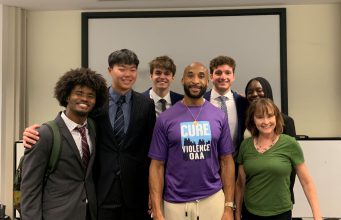
Forty-five promising undergraduate students from top business schools left this year’s Undergraduate Business School Leadership Conference at the Goizueta Business School with a better understanding of the relationship between global issues and business and inspired to make positive change.
First hosted by Emory in 2000, UBSLC is an annual student-run international conference that provides a forum for top undergraduate business students to meet with leading business executives, cultivate meaningful connections and become more effective leaders and professionals.
This year’s theme, Global Partnerships: A Leadership Perspective, was designed to give students a global perspective on business leadership. Sessions highlighted the importance of global interconnectivity and how young professionals can actively make their careers globally focused. In addition to networking, campus tours and field trips over the three-day event, students heard a keynote on global leadership from Steve Sear, president-international and executive vice president of Global Sales for Delta Air Lines.
Business and social impact
On the conference’s closing day, students had a unique opportunity to have a discussion on the interconnectivity between business and the cycle of economic inequality and poverty during a session hosted by Wesley Longhofer, assistant professor of organization and management.

As Longhofer shared, research shows that inequality overall is on the rise, both among individuals and among companies, and has a huge impact on global poverty. Students explored whether business is doing enough to end the cycle of inequality, as well as what is the “acceptable” level of inequality.
“In medical school, you learn about sick patients,” Longhofer said. “In law school, you help the underprivileged achieve, and in engineering school, you learn how to prevent bridges from collapsing. So, what is the equivalent in a business school? There is a common good to these arguments that don’t fit into a balance sheet.”
Students commented that access to education and training is key to lifting individuals out of poverty but also stressed that it starts with providing tomorrow’s business leaders with a better foundation on these important global issues and how to address issues holistically, rather than relying solely on donations and standard social responsibility efforts.
The consensus from this year’s class is that business schools must place greater emphasis on the full purpose of business, creating greater empathy and awareness by incorporating global poverty and inequality much earlier in undergraduate curriculum.
Today, most undergraduate business schools offer business ethics and society courses as electives, and most students don’t take it until their senior year, Longhofer said.
In today’s global marketplace, students noted that global issues such as air quality and pollution “don’t just stop at borders” and stressed the importance of exploring how our global society is impacted by business decisions. One student’s comments seem to summarize the feeling in the room on changing the conversation in business schools: “We have the power to influence our schools and make a difference.”
Learning to lead
In the final afternoon session, students also received practical advice on business leadership from a panel of Emory and UBSLC alumni that included:
- Jordan Angel 14BBA, PricewaterhouseCoopers
- Raeesa Chinikamwala 15BBA, Turner Broadcasting
- Connor Leydecker 14BBA, Delta Air Lines
- Hannah Chung 13BBA, PricewaterhouseCoopers
- Patrick McBride 14BBA, Kurt Salmon
The panel encouraged students to explore opportunities to work on teams whenever possible to develop leadership skills and build relationships.
“It helps you develop more of a global mindset when you work with people of different backgrounds and thought processes, philosophies and work ethics,” McBride said.

The panel advised students to sharpen their global leadership skills by getting to know the needs and working styles of diverse audiences, being sensitive to local cultures, remaining flexible in how they approach business communication issues, and being knowledgeable on a range of business topics.
“Leaders in global organizations are proactive and knowledgeable enough about a range of topics and are great relationship builders,” Leydecker said.
They also challenged students to take ideas from the conference back to their respective campuses. Chinikamwala noted that Notre Dame’s undergraduate business council started due to an attendee’s participation at a previous UBSLC event.
Angel added that students have the power to make change on their campuses. “If you don’t like something, change it,” Angel said. “Put good energy to use and make your school and space better.”











